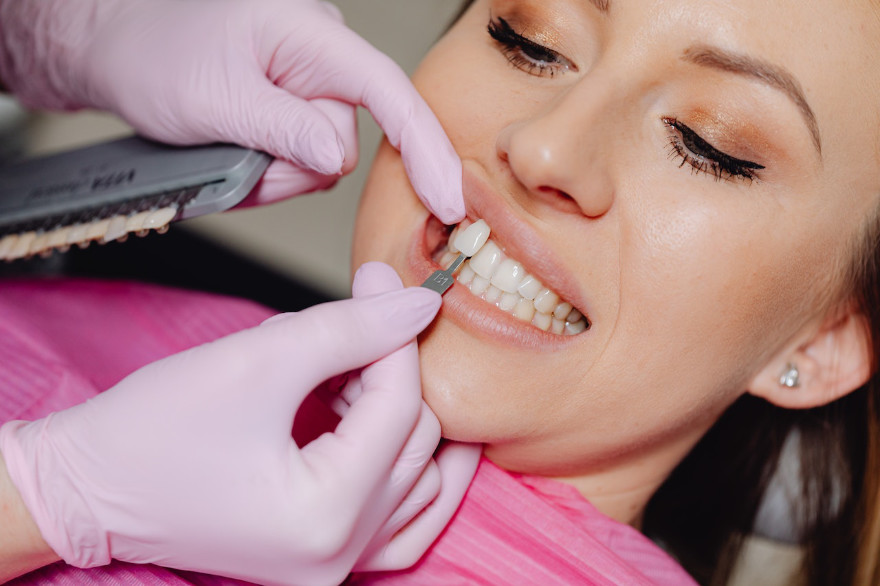Veneers
Do you want to improve the appearance of your smile? Do you have chipped, stained, crooked, or uneven teeth? If so, you may be interested in dental veneers. Dental veneers are thin shells of tooth-colored material that are bonded to the front surface of your teeth. They can change the color, shape, size, or length of your teeth and give you a natural-looking and beautiful smile.

2 Types of Veneers
At our dental office, we offer two types of dental veneers: porcelain and composite. Both types have their own advantages and disadvantages. Here is what you need to know about them:
- Porcelain veneers: Porcelain veneers are made of high-quality ceramic material that mimics the look and feel of natural enamel. They are very durable and resistant to stains and chips. They can also reflect light in a similar way as natural teeth, giving them a realistic appearance. Porcelain veneers require two appointments to complete. In the first appointment, we will prepare your teeth by removing a thin layer of enamel and taking impressions of your teeth. We will then send these impressions to a dental laboratory where your custom-made porcelain veneers will be fabricated. In the second appointment, we will bond your porcelain veneers to your teeth with a special cement and make any necessary adjustments.
- Composite veneers: Composite veneers are made of tooth-colored resin material that is applied directly to your teeth and sculpted into shape. They are less expensive and less invasive than porcelain veneers as they require little or no enamel removal. They can also be completed in one appointment as they do not need to be sent to a laboratory for fabrication. However, composite veneers are not as durable or stain-resistant as porcelain veneers and may need more maintenance and replacement over time.
A Balanced Perspective
The benefits of dental veneers include:
- Improved appearance: Dental veneers can enhance the aesthetics of your smile by correcting various cosmetic issues such as chips, cracks, discoloration, gaps, misalignment, or worn-down teeth.
- Customized fit: Dental veneers are tailored to fit your specific teeth and preferences. You can choose the shade, shape, and size of your veneers to match your natural teeth or create a new look.
- Minimally invasive: Dental veneers require minimal tooth preparation compared to other restorative options such as crowns or bridges. They preserve most of your natural tooth structure while improving its function and appearance.
However, dental veneers also have some limitations that you should be aware of before deciding to get them. Here are some of them:
- Irreversible: Since the process requires the removal of some tooth enamel, you cannot reverse the process and go back to your natural teeth. Veneers that are removed would need to be replaced by new veneers or crowns.
- Not Covered: Considered a cosmetic procedure, dental veneers are not covered by most insurance plans.
- Sensitivity: Some have experienced an increase in sensitivity to hot or cold drinks or food.
- Durability: Veneers are not as durable as crowns and it is possible for them to chip, crack, discolor, or detach due to normal wear or trauma. The expected lifespan of dental veneers is ten years.
- Maintenance: To keep veneers in good condition, good oral hygiene and regular dental visits are key.
- Food: Biting hard foods such as ice, nuts, or candy can potentially damage veneers. Dark colored drinks such as wine, tea, and coffee can cause staining.
